 Mysteries
Mysteries  Mysteries
Mysteries  Weird Stuff
Weird Stuff 10 Celebrities Who Have Admitted to Alien Encounters
 Our World
Our World 10 Surprising Secrets of Notre Dame Cathedral
 Miscellaneous
Miscellaneous 10 Intriguing Origins of Popular Carnival Rides
 Weird Stuff
Weird Stuff Ten Unexpected Discoveries Involving Vomit
 Movies and TV
Movies and TV 10 Actors Who Almost Didn’t Take Career-Defining Roles
 Technology
Technology 10 Little-Known Shifts in Computer Science
 Religion
Religion 10 Catholic Histories That Reveal Acceptance of Abortion and Contraception
 Politics
Politics 10 Lesser-Known “First and Only” Facts about U.S. Presidents
 Miscellaneous
Miscellaneous 10 Things You May Not Know about the Fourth of July
 Mysteries
Mysteries 10 Scientific Mysteries We Don’t Fully Understand
 Weird Stuff
Weird Stuff 10 Celebrities Who Have Admitted to Alien Encounters
 Our World
Our World 10 Surprising Secrets of Notre Dame Cathedral
Who's Behind Listverse?

Jamie Frater
Head Editor
Jamie founded Listverse due to an insatiable desire to share fascinating, obscure, and bizarre facts. He has been a guest speaker on numerous national radio and television stations and is a five time published author.
More About Us Miscellaneous
Miscellaneous 10 Intriguing Origins of Popular Carnival Rides
 Weird Stuff
Weird Stuff Ten Unexpected Discoveries Involving Vomit
 Movies and TV
Movies and TV 10 Actors Who Almost Didn’t Take Career-Defining Roles
 Technology
Technology 10 Little-Known Shifts in Computer Science
 Religion
Religion 10 Catholic Histories That Reveal Acceptance of Abortion and Contraception
 Politics
Politics 10 Lesser-Known “First and Only” Facts about U.S. Presidents
 Miscellaneous
Miscellaneous 10 Things You May Not Know about the Fourth of July
10 Horrifying Ways America’s Puritans Persecuted The Quakers
“I would carry fire in one hand,” an early American preacher once told his congregation, “to burn all the Quakers in the world.”
He was one of the Puritans who had set sail for America in search of religious tolerance. They had cried for freedom of religion in England, but once they’d landed in America, all those ideas of tolerance had quickly started to fade.
The Puritans were already becoming every bit as cruel as the people they’d tried to escape. And no religion would suffer as horribly under their hands than the Quakers.
10 The First Quakers In America Were Stripped, Beaten, And Starved

From the second the first Quakers set foot in America in 1656, the Puritan settlers abused them. Their names were Mary Fisher and Ann Austin, and they were missionaries from England, sent to spread their ideas of spiritualism and nonviolence to the New World. It nearly got them killed.
Almost as soon as they arrived, the women were arrested purely for being Quakers. The official charge was that they held “dangerous, heretical, and blasphemous opinions,” and they were to be stripped, beaten, and imprisoned.
The Puritans stripped them naked in the hopes that they’d find that the women were witches. If they found a witch’s teat, they believed, it would be justifiable to execute them, and so a group of women were sent to tear off the missionaries’ clothes and probe their bodies in search of an excuse to kill. At least, they were supposed to be women. Ann Austin would later insist that at least one of the people probing them was “a man in woman’s apparel.”[1]
The Puritans couldn’t find anything that would give them an excuse to hang the Quakers, so they settled on throwing them in prison and starving them to death. The women weren’t even allowed bread. If it weren’t for a local named Nicholas Upsall taking pity on them, they undoubtedly would have died slow and horrible deaths.
Upsall bribed the guards to sneak them food and managed to keep Fisher and Austin alive. Still, the colony kept them in chains for five weeks before finally giving up and sending the women on a one-way trip to Barbados.
9 Puritans Fined Anyone Who Brought A Quaker To America
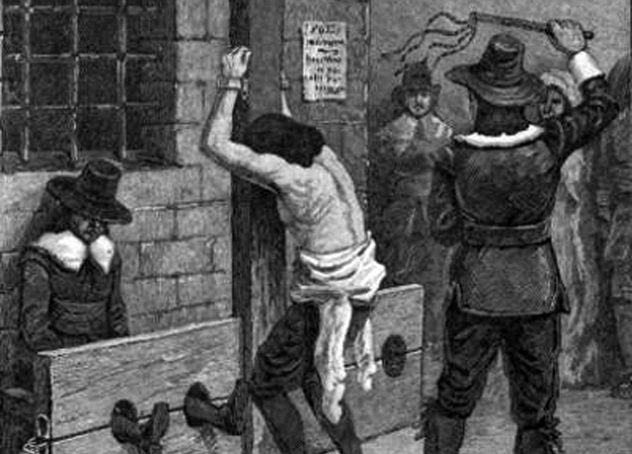
After Fisher and Austin left, the Puritans didn’t get any nicer to the Quakers. As far as they were concerned, the Quakers who were starting to visit America were a threat to their religion. They saw them, as one Puritan put it, as “instruments for propagating the kingdom of Satan,” and they weren’t going to put up with them.[2]
A new law was introduced in New England making it a crime to bring any Quaker to the colony. Any ship docking at the colony with a Quaker on board would be fined £100 and forced to send the Quaker back at their own expense. If they didn’t comply, they would be thrown into prison until they changed their minds. The Quakers themselves were to be whipped with 20 stripes, thrown in jail, and forced to do hard labor until they were ready to be sent back to their homelands.
The Quakers’ books were considered such a threat that the colony wouldn’t even risk letting someone look at them. Any person living in New England who so much as spotted a Quaker book was required to immediately bring it to the magistrate to have it burned. And if they were ever caught defending a Quaker, they could be fined, imprisoned, or even banished.
None of that stopped the Quakers from sending missionaries to America, though. When no one would take them across the Atlantic Ocean, they simply built a boat of their own.
8 Women Were Stripped Naked And Beaten
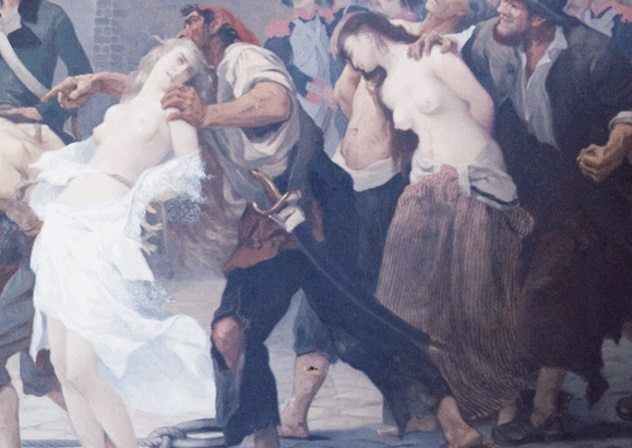
Quaker women weren’t just beaten and imprisoned. The Puritans turned abusing Quakers into a weirdly sexual display. They would strip them naked down to the waist and parade them through the town, whipping their backs as they went.
One of the most brutal incidents happened to three women named Ann Coleman, Mary Tompkins, and Alice Ambrose. In the dead of winter, these women were stripped naked, tied to the back of a cart, and dragged through the streets while a man followed them, whipping their backs.
These women weren’t just paraded down one street—they were dragged through the main streets of 11 separate towns on a journey that stretched across 130 kilometers (80 mi).[3] Each time they reached a new town, they’d have a local woman strip them bare and a constable beat them bloody.
It was horrible, but it was far from the only time it happened. Countless Quaker women were stripped and beaten by the Puritans, sometimes while their husbands were forced to march behind them and watch the women they loved being brutalized. And all in the name of Jesus Christ.
7 Quakers Caught In Massachusetts Had Their Ears Cut Off

Puritan laws only became harsher. From 1656 on, every male Quaker caught in Massachusetts was to have his right ear cut off. If they came back, they’d lose the other ear. And if they came back again, they would have their tongues bored through with a red-hot iron.
The first men to lose their ears were Christopher Holder and John Copeland. They had come to New England on the Woodhouse, the boat the Quakers built after New England’s governors made it a crime to transport them to the New World.
At first, the Puritans were a little squeamish about enforcing their laws. Holder and Copeland had already been kicked out of the Massachusetts Bay Colony too many times to count, but they kept coming back no matter what happened to them.
The Puritans got fed up. On July 17, 1658, they dragged Holder and Copeland to prison and chopped off both men’s right ears.[4] They were kept in prison, where they were brutally and repeatedly whipped on a set schedule for nine weeks straight. Then, finally, they were forcibly sent back to England.
If they returned, the Puritans promised, they would be executed on the spot.
6 Four Quakers Were Murdered For Their Beliefs
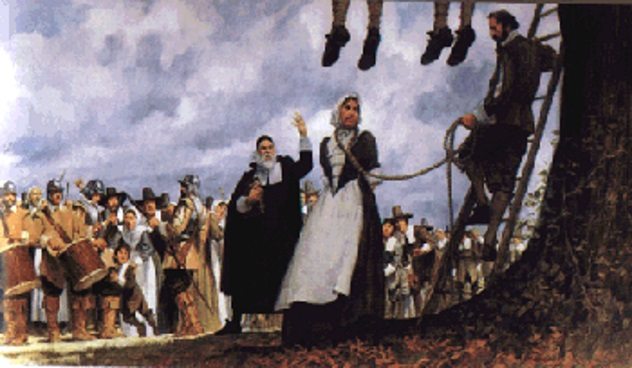
Holder and Copeland were never killed by the Puritans, though they did return. Both men were thrown in prison and promised a death sentence, but the Puritans, perhaps out of some lingering unwillingness to kill, ended up just kicking them out of the country again.
It was the last time they would ever show mercy to a Quaker. Five days later, a group of three Quakers showed up to protest the treatment Holder and Copeland had received—and soon became the first Quakers killed.
Two of them, Marmaduke Stephenson and William Robinson, were dragged out and hanged in front of a cheering crowd. But the third, Mary Dyer, was spared. Her son begged the governor not to kill her, promising she’d never come back if they let her go.
They made Dyer watch her friends die, but they let her return to England as long as she promised never to come back.[5] Dyer’s faith, though, was too strong for her to stop preaching her religion. Within a year, she’d returned to Boston. The Puritans made good on their promise. She and the man she brought with her, William Leddra, became the next two people to be executed for being Quakers.
5 Dead Quakers’ Bodies Were Desecrated And Humiliated
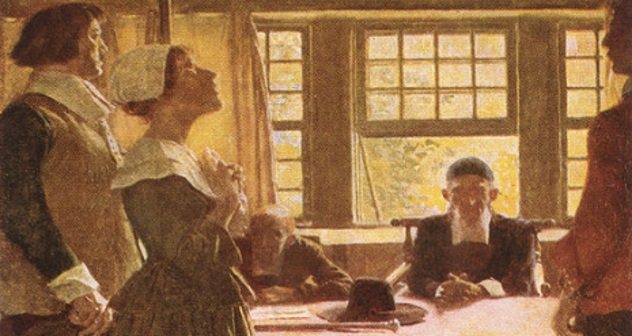
Before Mary Dyer was killed, she had a stillborn child. It was a horrible experience. With the help of a few sympathetic locals, she quickly buried the dead child in a dignified grave outside Boston and then returned to await the day she would join the baby she’d lost.
When Governor John Winthrop found out, though, he used her tragedy to humiliate her in the most horrible way imaginable. Winthrop had Dyer’s baby pulled out of the grave and shown to the public. Her dead baby, he said, was “a monster,” and it was proof that Dyer was a witch.[6]
Dyer’s body wasn’t treated any better. Under the orders of her executioners, she was left hanging from the gallows. One of her murderers, General Atherton, boasted, “She hangs like a flag for others to take example from.”
Nicholas Upsall, the man who saved Mary Fisher and Ann Austin from starvation, tried to get Dyer a decent burial. He wanted her buried in a respectable grave and wanted to build a fence around it to keep her body safe. His request, though, was denied. Dyer was buried without ceremony.
4 The Puritans Threatened Rhode Island For Harboring Quakers
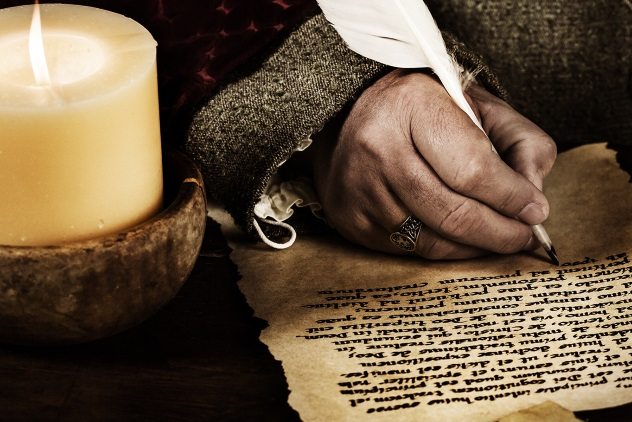
Not everybody in America hated the Quakers. Most Native American tribes had a fairly good relationship with them. One Native American, after giving refuge to a Quaker on the run from the Puritans, famously remarked, “What a God have the English, who deal so with one another about their God?”
The greatest refuge for Quakers in the New World, though, was Rhode Island. It was the one place in America that refused to persecute them for their faith. As the Puritans chased more and more of them from their colonies, more and more Quakers found themselves hiding in the protection of Rhode Island—and that made the Puritans furious.
The Puritans of New England threatened the Colony of Rhode Island, telling them that they would cut off all communication and trade if they didn’t start torturing, exiling, and executing Quakers. Rhode Island, though, refused. Their governor, Benedict Arnold (not the Revolutionary War defector), sent a letter back that said, “We have no laws among us, whereby to punish any for only declaring [their views] by words.”[7]
3 People Who Spoke Out In Their Defense Were Arrested

The Dutch colonies of New Netherlands weren’t as kind. Their governor, Peter Stuyvesant, didn’t do anything to protect the Quakers. Instead, he made it illegal to so much as allow a Quaker into one’s home. And when the people complained, he threw them in prison.
A group of citizens led by a man named Edward Hart drafted up a long letter protesting the persecution of the Quakers. Not a single person who signed the letter was a Quaker, but they couldn’t stand idly by while people were being killed. As far as they were concerned, the colony’s persecution was a violation of both Christ’s teachings and the colony’s charter.
“We are bound by the law to do good unto all men,” they wrote. “If any of these said persons come in love unto us, we cannot in conscience lay violent hands upon them.”
Stuyvesant wasn’t impressed. Every person who signed the paper was arrested, and those who held a government job were fired on the spot.[8] They were sent to prison and fed nothing but bread and water and told they wouldn’t be freed until they renounced their support for the Quakers.
Edward Hart was the only one who didn’t take back his words. Every other person involved recanted and promised to support religious persecution. Hart, instead, was kept in prison until they got worried he would die under their watch. Then he was banished from the colony.
2 Two Quaker Children Were Almost Sold Into Slavery
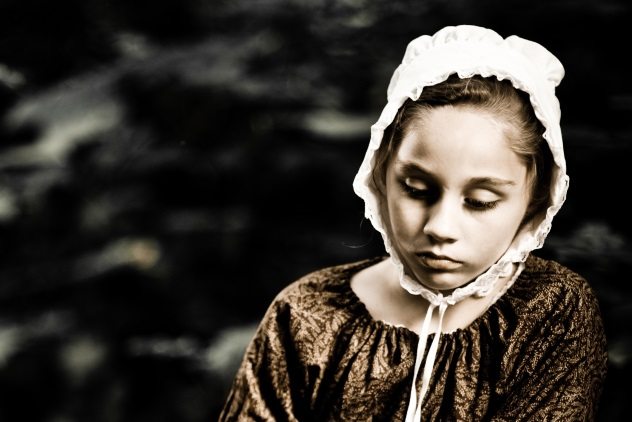
In 1659, the government of Salem tried to forcibly pull two children away from their parents, ship them off to Barbados, and sell them into slavery.[9]
Their names were Daniel and Provided Southwick, and their parents had converted to the Quaker faith two years before. Their conversion wasn’t easy. The Southwicks were repeatedly beaten, imprisoned, and given massive fines, all in an effort to scare them into renouncing their faith.
Those fines added up, and soon, the Southwicks owed more money than they could possibly pay. The Puritans dealt with it by breaking down their doors and confiscating all the things they owned, but even after all their possessions were stolen, they still hadn’t paid their dues.
And so the governor came up with a new plan. The Southwicks would cover the rest of what they owed, he declared, by being forced to sell two of their children as slaves.
Fortunately, it never happened. Not a single captain in the country was willing to let them use his boat to sell two children into slavery. In the end, the Southwicks were simply banished from the colony. Their new fate, though, wasn’t much better. Shortly after being exiled from Salem, the parents died. The children were left to fend for themselves.
1 Europe Had To Intervene To Save The Quakers

Americans never stopped torturing Quakers—or, at least, not of their own free will. In the end, they were forced to leave them alone.
It started when a man in New Netherlands named John Bowne was arrested for inviting a Quaker into his house.[10] It was hardly the first time it had happened; many had already been arrested or banished for the same crime. Bowne, though, stood his ground in a way nobody had before. He refused to pay his fine or even to stand before the court on trial, insisting instead that he stand trial in Holland. The governor had no choice. He had to let him go.
Bowne told the European court everything that was happening to the Quakers of America. The court was shocked and soon wrote the governor of New Netherlands, ordering him to put an end to the persecution of the Quakers.
That’s how it ended—not with anybody in America having a change of heart but with a European government forcing them to behave. In 1689, the English government would follow suit and ban the persecution of the Quakers, as well. Religious tolerance finally came to America—under the orders of European kings.
Read more stories of religious persecution on 10 Horrifying Tortures Of Early Christians and Top 10 Most Dangerous Countries for Christians.








